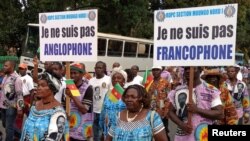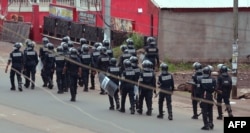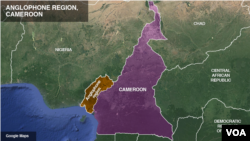Two gendarmes were attacked and killed by armed men late Tuesday in the northwestern town of Bamenda, said Cameroon's government spokesperson Issa Tchiroma. The killings came barely 24 hours after another gendarme was shot dead in the town of Jakiri, also in the northwest.
The violence represents a marked escalation as the unrest in Cameroon's two anglophone regions nears the one-year mark.
Tchiroma said armed men who had attacked a school in Jakiri seized the gendarme's gun and used it to kill him.
"The persistence of these acts of violence has become incomprehensible and hides the maneuvers of some people who cheerfully manipulate the population, and especially the youths, in support of a hidden agenda," Tchiroma said. "Emergency measures have been taken in order to arrest the breakers, identify and sort out their sponsors and accomplices."
Four schools, as well as shops, in Bamenda were burned last week. No one has claimed responsibility for the attacks.
On social media, activists have threatened schools and businesses in Cameroon's two anglophone regions that fail to observe calls to strike. There have been numerous arson attacks on schools and markets since the start of this year.
Some parents, however, are defying calls to keep their children home.
"There is no need, striking and making children to stay in the house because that is like killing a whole generation," said one father, Innocent Ekale.
The government reports that more than 40 percent of students have resumed classes in the major urban areas of the northwest and the southwest.
Schools remain closed in villages where residents complain of mounting insecurity. The residents blame both separatist groups and soldiers.
The crisis began in November of last year when English-speaking lawyers and teachers went on strike demanding reforms to address the overbearing use of French in the bilingual country. Tensions quickly intensified as anglophone separatist groups joined the movement, sparking a government crackdown and dozens of arrests.
Large pro-independence demonstrations on October 1 left dozens of people dead and more than 100 injured.
Government attempts to hold dialogue in the English-speaking regions last month made little progress.










